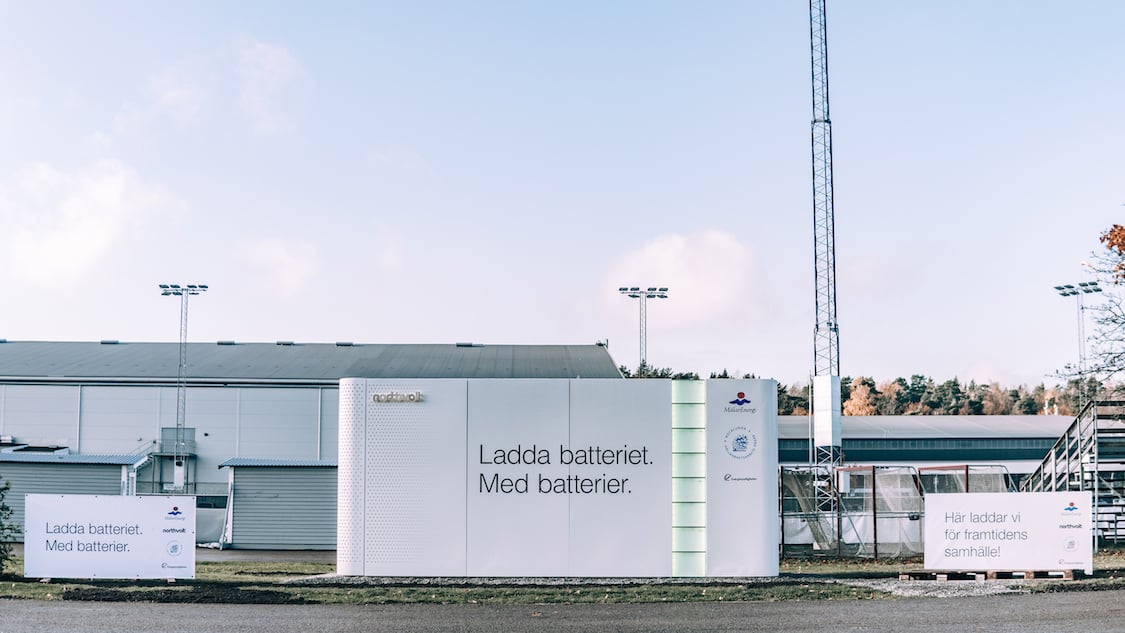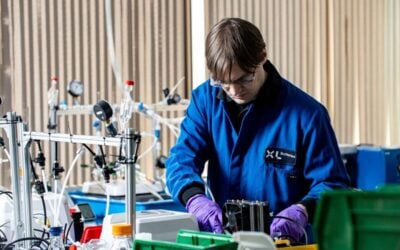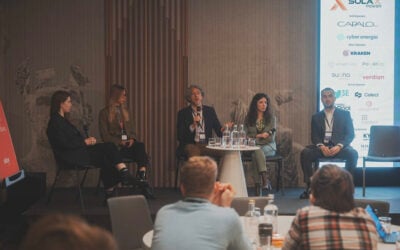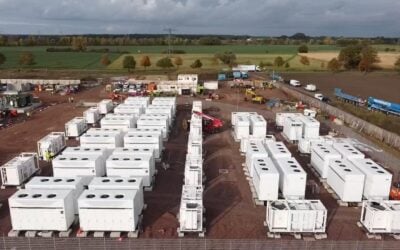
A lithium-ion battery recycling plant is under construction in Norway, focusing initially on electric vehicle (EV) batteries, but the CEO of the company behind it has said that it will also be capable of processing batteries from stationary energy storage systems (ESS).
The plant will be capable of processing more than 8,000 tonnes of EV battery modules annually when it opens later this year and is being built by Hydrovolt, a joint venture (JV) formed between Norwegian materials processing company Hydro and Sweden-headquartered lithium battery manufacturing startup Northvolt.
Frederik Andresen, CEO of Hydrovolt told Energy-Storage.news that his company was excited to get “properly started,” on constructing the “renewable-powered battery recycling plant”. Hydrovolt is aiming to recycle “several types of lithium-ion batteries,” Andresen said.
Partners Hydro and Northvolt have invested NOK120 million (US$13.94 million) into the project, building a factory which will have high levels of automation and will crush and sort batteries. Hydrovolt also received NOK43.5 million in funding from Norwegian government enterprise Enova, which supports clean energy and climate initiatives. Batteries will be supplied by Batteriretur, which already collects and recycles batteries from around Norway and has a facility next to the site of the new Hydrovolt plant in Fredrikstad.
Try Premium for just $1
- Full premium access for the first month at only $1
- Converts to an annual rate after 30 days unless cancelled
- Cancel anytime during the trial period
Premium Benefits
- Expert industry analysis and interviews
- Digital access to PV Tech Power journal
- Exclusive event discounts
Or get the full Premium subscription right away
Or continue reading this article for free
Batteriretur will also operate the plant, while Hydrovolt’s operations will be “closely integrated” with Hydro and Northvolt’s businesses: Northvolt is currently building dozens of gigawatt-hours of battery manufacturing capacity in Sweden and Germany, aiming to serve as much as 25% of Europe’s total demand for lithium batteries, including mainly automotive but also stationary applications.
Hydro meanwhile has a more than 100 year history in industries including fertilisers, aluminium and – as implied by the name – hydroelectric power. Hydro will recycle and reuse aluminium from batteries and battery packs and Northvolt will take cobalt, lithium, manganese and nickel from the “black mass” produced by hydrometallurgical processing. The battery maker will then either reuse the materials or sell them on.
Late last year it was revealed that Japanese electronics maker Panasonic signed a Memorandum of Understanding (MoU) with Hydro and Norwegian state majority-owned Equinor (formerly Statoil) to investigate setting up a “green battery business” in Norway. Another start-up company, FREYR Battery, is seeking to establish a lithium battery gigafactory in the country and said today that it is seeking to float on the New York Stock Exchange via a Special Purpose Acquisition Company (SPAC).
‘Urban mining’ will be essential for a sustainable battery industry
CEO Andresen told Energy-Storage.news that with Norway one of the world’s fastest adopters of EVs in the world, Hydrovolt “found it natural to start with batteries and modules from EVs”.
“Norway will be one of the first markets with batteries from end of life EV batteries available for recycling,” Andresen said.
“But we can also recycle batteries from ESS and other applications for ex from the marine sector in the facility we’re building, and with the capacity available we plan to source from other markets and sectors as well.”
Andresen said that there is an expectation that the processing and recycling of batteries from energy storage systems “will of course grow significantly over time”.
Energy-Storage.news also asked if the batteries or materials taken from batteries from the EV sector could be used in stationary applications, or vice versa. Andresen said that “the use of materials taken from EV batteries for use in other applications… is also a field we are engaging in”.
“This can be on pure supply of recycled materials for battery production but also re-use of certain components from the battery. Several projects have been carried out in Norway on re-use and there is some potential there.”
The Hydrovolt CEO said that the adoption of new battery regulations by the EU, which raise the accountability and transparency of battery supply chains in Europe and will introduce standards on materials sustainability and CO2 emissions, are key to the overall value proposition for repurposing batteries from one application to another. The regulations will also support re-use to a certain extent, he said.
“From an environmental point of view, urban mining will be essential going forward to make sure that the materials inside the batteries are used over and over again, and we aim to play our part to make that happen,” Andresen said. Aiming to make Hydrovolt a “one stop shop” for lithium-ion batteries, the CEO said the facility could be replicable elsewhere and the company “will explore and consider other location as well over time”.
“We are very excited about the start of constructing our renewable-powered battery recycling plant. We will use 2021 to explore further how we can support OEMs and others players in implementing CO2-friendly recycling.”
While commercial recycling of lithium-ion batteries, including repurposing packs for second life use is expected to become big business in time, so far Li-cycle’s facilities in Ontario, Canada and in New York are among the only commercial recycling plants outside of China and South Korea.
Meanwhile it’s been a big few days for Europe’s lithium battery manufacturing sector with €2.9 billion (US$3.5 billion) of State Aid funding approved by the EU for use by Member States to support projects in their countries and Finland just announced a National Battery Strategy to capitalise on raw materials available within its borders.





